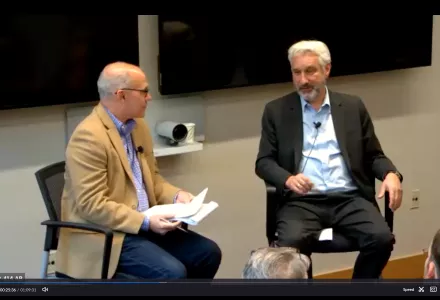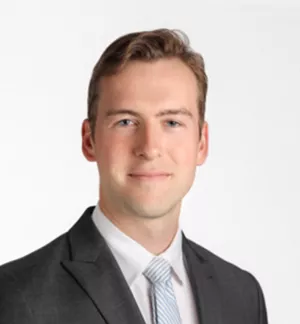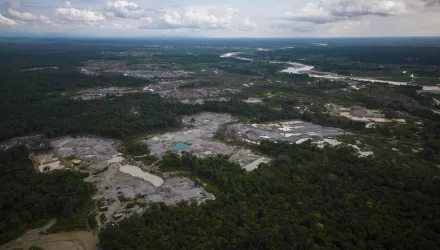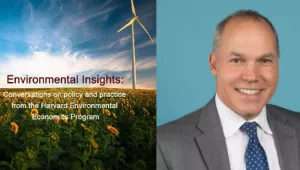
Key Takeaways
- The next UN Conference of the Parties is set to take place in the United Arab Emirates from November 30 to December 12, where official climate negotiations will occur alongside a multitude of meetings and associated dialogues between tens of thousands of stakeholders.
- The nature of the COP process today has evolved to include both “top-down” and “bottom-up” approaches to taking action on climate change, reflecting the growing urgency to meet established targets under a 1.5-degree Celsius warming scenario.
- While the world has made significant progress in passing actionable policies, we remain short of the 1.5 degree warming target even when considering voluntary, non-binding ambitions, necessitating the need to continue the dialogue at COP and beyond.
With the 28th UN Conference of the Parties (COP28) set to kick off in Dubai at the end of November, Harvard Kennedy School hosted Elliot Diringer, Senior Policy Advisor in the office of the Special Presidential Envoy for Climate John Kerry, for a conversation on “taking stock of the international climate effort” as part of the Energy Policy Seminar Series. Diringer—who is a former Neiman Fellow at HKS (a fellowship for mid-career journalists)—has attended a whopping 24 COPs and shared his perspective with a full room of interested students and community members on how the international dialogue on climate change has changed over the years.
Reflecting on the earliest COPs, Diringer noted that the conference has evolved from primarily multilateral negotiations featuring a select group of negotiators to a major international event that includes tens of thousands of attendees. Many of today’s attendees do not participate in the actual negotiations but instead use the opportunity to work on issues outside of the negotiations, sign agreements, and make high-profile announcements or new commitments. While COP5 was hosted entirely within one hotel in 1999 in Bonn, Germany, that would be unthinkable today, where events take place across sprawling complexes of multiple “zones” and pavilions for different topics and functions.
This change reflects what Diringer called “the emergence of a hybrid approach between top-down and bottom-up elements” of the climate change effort that evolved after the Kyoto Protocol was adopted in 1997. While governments continue to negotiate on “top-down” actions such as binding national commitments and support for mitigation and adaptation, a “bottoms-up” approach emerged through the Cancun Agreements and subsequent dialogues that included voluntary, non-binding contributions and the increasing role of the private sector and NGOs in driving voluntary emissions reduction. Culminating in the Paris Agreement in 2015, the combination of the “top-down” and “bottoms-up” approach is what drives conversation today. To Diringer, this was “an acceptance of the limits of the multilateral process” and the recognition that, while COP must continue to facilitate the solution, “the solution has to come from everywhere.”
As a natural result of this evolution, there has been a broad proliferation of climate action outside of the UN framework. Climate has been embedded into many other government objectives, the private and nonprofit sectors are pre-emptively taking action in many areas, and many other fora are emerging for multilateral dialogue on climate action outside of the annual COP. Diringer spoke of his work on one such initiative called the Major Economies Forum, an alternative forum for climate discussions spearheaded by the U.S. Department of State. Its purpose has evolved from simply being a space to pre-negotiate issues ahead of COP to also being a way to motivate collective action from “coalitions of the willing” to tackle specific climate challenges such as a recent initiative to combat fugitive methane emissions.
Diringer stressed the importance of creating such safe spaces for dialogue in order to advance progress in the official COP negotiations. The impasses that emerged at COP15 in Copenhagen showed that there is tremendous value in informally convening parties to better understand one another’s positions before COP, and beginning to make progress on mutually agreeable terms. While the United States has opposed language around liability and compensation related to the rising focus on climate change “loss and damage” in recent COPs, continued dialogue has made it possible to align on the goal—raised at the last COP in Egypt—to establish a fund for loss and damage that the United States was able to embrace.
“Taking stock” is both a formal process that the UN parties undertake every five years and also an informal exercise that we all must individually do to reflect on the collective progress that we’ve made in combatting climate change, Diringer said. And progress has been made—the IEA now estimates that, with current policies now in place, the world is on a path to 2.5 degrees (Celsius) of warming—down from 3.5 degrees before the Paris Agreement. While this is still above the 1.5 degree threshold, it marks significant improvement.
However, this reflects that there is still a gap. Even when taking into account announced ambitions from countries (nonbinding), we are on track to reach 1.7 degrees of warming by 2050, according to the same IEA estimates. There also remains an implementation gap—where the rubber must meet the road to make good on the policies that have been passed. Diringer also stressed that we need to move faster to reduce non-CO2 emissions (from other greenhouse gases like methane) and that he hopes that the next UN “stocktake” signals to parties that the next round of Nationally Determined Contributions need to cover all sectors of their economies, aligned to the 1.5 degree threshold scenario.
Diringer expressed a wry excitement about his 25th COP—although he confessed to not having bought his tickets yet.
Watch the recording of Diringer's talk below.
Floyd, Matt. “Event Debrief: Elliot Diringer Takes Stock of the International Climate Effort.” Belfer Center for Science and International Affairs, Harvard Kennedy School, December 21, 2023




